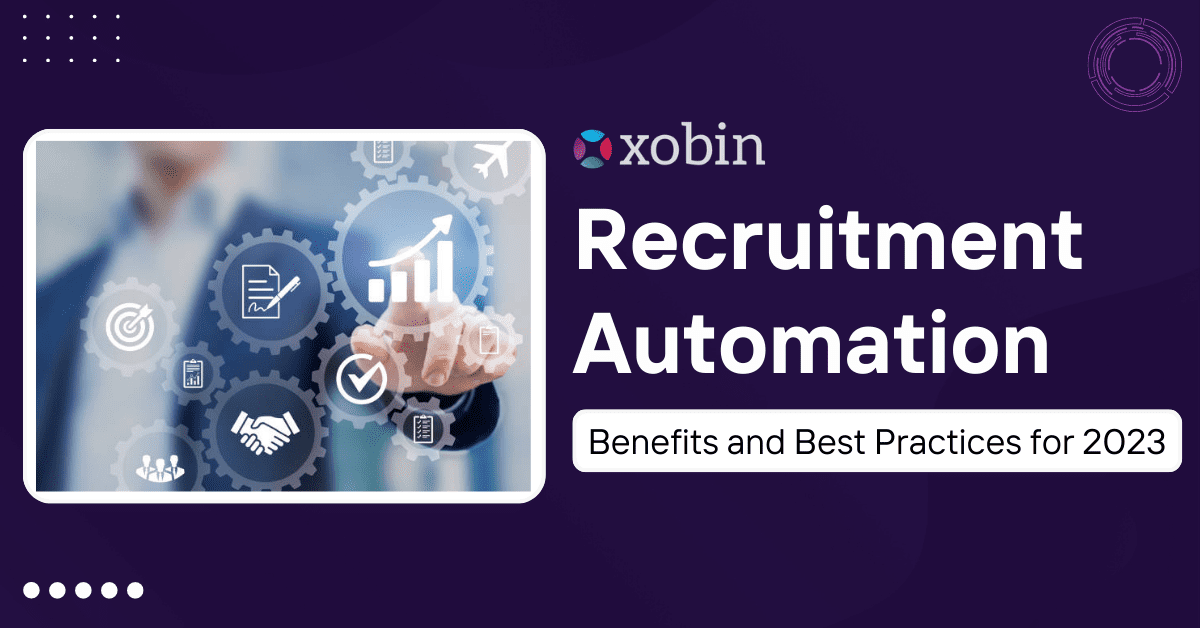In a fast-paced and competitive job market, recruitment professionals are increasingly turning to AI-based recruitment software. These tools streamline hiring processes and offer a competitive edge. The use of technology and artificial intelligence (AI) in recruitment has transformed the HR industry, enabling organizations to enhance efficiency, improve candidate experiences, and make data-driven decisions.
Table of Contents
Recruitment automation refers to the application of technology and AI algorithms to automate various aspects of the hiring process. Like from candidate sourcing and screening to interview scheduling and onboarding. By leveraging automation tools, HR professionals can optimize their workflow management, save time, and focus on strategic tasks that require human judgment and expertise.
Benefits of Recruitment Automation
Throughout this blog, we will explore the numerous benefits of recruitment automation and delve into the best practices for successful implementation. By embracing HR automation, organizations can experience:
Streamlined Candidate Sourcing and Screening
Discover how automated tools and algorithms can efficiently search for and filter candidates based on specific criteria, reducing manual efforts and time spent on initial screening.
Improved Efficiency and Time Savings
Learn how automation streamlines administrative tasks, such as pre hire testing, interview scheduling, and applicant tracking, freeing up valuable time for HR professionals to focus on building relationships and strategic decision-making.
Enhanced Candidate Experience and Engagement:
Explore how automation can create personalized experiences for candidates, from AI-powered chatbots providing real-time responses to automated status updates and feedback, ensuring candidates feel valued and engaged throughout the hiring process.
Data-Driven Decision Making and Analytics
Uncover the power of data analytics in recruitment, as automation tools generate insights and metrics. As a result, that enable evidence based decision-making, improving the quality of hires and driving organizational success.
Increased Accuracy and Reduced Bias in Hiring
Understand how automation helps mitigate unconscious biases and ensures a fair and objective evaluation of candidates. As a result, leading to more diverse and inclusive hiring practices.
Best Practices in Recruitment Automation
To fully leverage the benefits of recruitment automation, we will discuss essential best practices, including:

Assessing and Understanding Your Recruitment Needs
Determine the specific pain points and objectives within your hiring process to identify the areas where automation can make the most significant impact.
Choosing the Right Recruitment Automation Tools
Explore various tools and technologies available on the market, considering factors such as compatibility with your existing systems, ease of implementation, scalability, and customization options.
Integrating Automation with Existing HR Systems
Learn how to seamlessly integrate automation tools with your candidates screening and applicants tracking system (ATS). As well as with HRMS, and other relevant platforms to ensure data consistency and streamline processes.
Designing Effective Automated Workflows and Processes
Discover strategies for designing efficient and user-friendly automated workflows, aligning them with your organization’s unique recruitment processes while optimizing efficiency and candidate experience.
Ensuring Data Security and Compliance
Explore best practices for ensuring data security and compliance. Such as, privacy regulations, including data encryption, secure storage, and obtaining candidate consent for data processing.
Training and Upskilling HR’s on Recruitment Automation Tools
Understand the importance of upskilling HR professionals to effectively utilize as well as manage automation tools. Hence, equipping them with the necessary skills to leverage AI technologies in recruitment.
Continuous Monitoring and Optimization of Automated Processes
Learn how to continuously monitor and evaluate the performance of your automated recruitment processes, making necessary adjustments and optimizations based on feedback and data analysis.
By incorporating these best practices, organizations can maximize the benefits of recruitment automation and elevate their hiring practices to new heights.
Challenges and Considerations of AI tools or Recruitment Automation
As organizations embrace recruitment automation, they encounter various challenges and considerations. Hence, this considerations need to be addressed to ensure successful implementation and utilization of technology. Interestingly, here focuses on overcoming these challenges and provides insights into key considerations for recruiters and HR professionals.
Balancing Recruitment Automation with Personalization
Finding the right balance between automation workflow and personalization is crucial in maintaining a positive candidate experience. This subtopic delves into strategies for incorporating a human touch in automated processes. Automated processes such as personalized communication as well as feedback to foster meaningful connections and engagement.
Addressing Concerns around AI Bias and Ethical Considerations:
The use of AI in recruitment introduces concerns related to AI bias and ethical considerations. So lets explore the steps organizations can take to address these concerns, including algorithmic transparency, regular audits. As well as adopting ethical guidelines to ensure fair and unbiased decision-making throughout the hiring process.
Managing Resistance and Fostering Buy-in from Stakeholders
Resistance to change is a common challenge when implementing recruitment automation. So, this examines strategies for managing resistance, including effective communication, stakeholder involvement. Also, showcasing the benefits of automation to gain buy-in from hiring managers, HR teams, and other key stakeholders.
Adapting to Evolving Technology and Market Trends
Technology and market trends are constantly evolving, shaping the recruitment landscape. This section explores the importance of staying updated with emerging technologies. Tools like AI-driven tools, chatbots, and predictive analytics and many more. Also, how organizations can adapt their recruitment strategies to leverage these advancements effectively.
By addressing these challenges and considerations, organizations can navigate the complexities of recruitment. Complexities like automation, leverage its benefits, and drive successful hiring outcomes in a rapidly changing talent acquisition landscape.
Future Trends in Recruitment Automation
As technology continues to advance, the recruitment landscape is undergoing a significant transformation. Recruitment automation is at the forefront of this revolution, enabling organizations to streamline their hiring processes, improve efficiency, and make data-driven hiring decisions. In this section, we will explore three key future trends in recruitment automation. So let me take you through them,

AI-driven chatbots and virtual assistants in candidate engagement
AI-driven chatbots and virtual assistants are revolutionizing candidate engagement. These intelligent tools can handle initial candidate queries, provide information about job openings, and assist with application processes. With their ability to provide personalized responses and real-time interaction, chatbots and virtual assistants enhance the candidate experience. Also, increase engagement, and save recruiters valuable time.
Predictive Analytics and Machine Learning for Talent Forecasting
Predictive analytics and machine learning offer invaluable insights for talent forecasting. By analyzing large volumes of historical data, these technologies can identify patterns, predict future talent needs, and optimize recruitment strategies. Recruiters can leverage predictive analytics to identify high-potential candidates, anticipate skills gaps, and make informed decisions about talent acquisition. We will explore the applications of predictive analytics and machine learning in talent forecasting, the challenges of data accuracy and bias, and the ethical considerations involved.
The Role of AI Recruitment Automation
The COVID-19 pandemic has accelerated the adoption of remote and hybrid work models, making automation crucial in managing recruitment processes. Automation tools enable recruiters to seamlessly conduct virtual interviews, assess candidates remotely, and streamline the onboarding process.
As recruitment automation continues to evolve, embracing these future trends will be essential for organizations to stay competitive. Also, to attract top talent, and optimize their recruitment strategies. Therefore, by leveraging AI-driven chatbots as well as automation for remote and mass recruitment organizations can explore the top talent.
Conclusion
Recruitment automation offers a multitude of benefits, including time savings, data-driven decision-making. Also it improves candidate experience, and adaptability to remote work. Hence, to thrive in the evolving talent landscape, organizations must embrace recruitment automation as well as leverage its benefits. Afterwards, they can achieve greater efficiency, effectiveness, and success in their hiring processes, setting the stage for a competitive edge and future growth.






